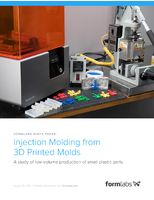Dow Expands CONTINUUM(TM) Polyethylene Resin Family
Share:
New CONTINUUM(TM) EP HDPE Resins Offer Opportunities to Enhance Performance, Processing, and Profits in Rigid Packaging Applications
CHICAGO, Nov. 2, 2010 -- The Dow Chemical Company ("Dow") has expanded the availability of CONTINUUM(TM) EP High Density Polyethylene (HDPE) Resins. This new generation of bimodal HDPE resins bridges the gap between conventional unimodal and bimodal HDPEs by offering the potential for enhanced performance, processing, and profits in blow molded bottle and drum applications. The resin was initially introduced at NPE 2009 and, with customer testing complete, is now commercially available.
"Since the release of experimental CONTINUUM(TM) EP HDPE Resins in 2009, our customers have seen improved operational efficiency, end-use performance and sustainability profiles," said Stacy Fields, Rigid Packaging Marketing Manager for Dow's North American Basic Plastics business. "The balance of performance and processing allows for a reduction in raw materials and energy usage, and as a result, gives the potential for significant cost reductions."
The CONTINUUM(TM) EP product family currently includes two bimodal resins:
o CONTINUUM EP-6630 HDPE for blow molded bottles
o XDMDA-6670 EP HDPE for large blow molded parts such as drums
Opportunities for Enhanced Performance
The dramatically enhanced environmental stress crack resistance (ESCR) of these resins offers the potential for significantly improved performance in existing applications - and equivalent or better performance in lightweighted containers. The exceptionally high ESCR of CONTINUUM(TM) EP HDPE Resins may also support their use for containing more aggressive substances such as industrial and agricultural chemicals and solvents in household and industrial chemical (HIC) and agricultural chemical (Ag Chem) applications.
The resins' high flexural modulus contributes to exceptional stiffness and, in turn, to excellent top load strength compared to conventional unimodal HDPEs and competitive bimodal HDPEs (3). The combination of excellent stiffness and ESCR - two critical performance criteria for blow molded containers - can also increase opportunities for lightweighting.
Opportunities for Enhanced Processing
Unlike conventional bimodal resins, CONTINUUM(TM) EP HDPE Resins can enable "drop-in" processing on existing equipment and tooling (4). These "drop-in" capabilities - which result from die swell, melt strength, and other properties similar to those of chrome-catalyzed unimodal resins - increase ease of implementation in current production settings, typically without the need for added capital (e.g., retooling, major process adjustments) or production delays. In addition to easier start-ups, improved pinch-off welds, and more uniform wall thickness versus conventional bimodal resins, this improved processing profile also offers the flexibility to run unimodal or bimodal multiple resins on the same machine with faster changeover times.
CONTINUUM(TM) EP HDPE Resins are designed to run efficiently on a wide range of extrusion blow molding (EBM) equipment. CONTINUUM EP-6630 HDPE offers "drop-in" processing of bottles with excellent performance on EBM equipment such as reciprocating screw/intermittent extrusion, continuous extrusion shuttle, and wheel blow molding lines. XDMDA-6670 EP HDPE enables improved processing of drums and other large industrial containers on accumulator head machines.
Opportunities for Enhanced Profits
In blow molded bottle and drum applications, the majority of production costs are typically attributable to the cost of resin raw materials. The excellent lightweighting capabilities of CONTINUUM(TM) EP HDPE Resins offer opportunities to decrease raw material use and overall costs, leading to increased profit potential. CONTINUUM EP HDPE Resins typically allow container weights to be reduced by approximately five to 10 percent while maintaining or improving end-use performance (5).
Lighter weight - and potentially better performing - containers may also offer several other sustainability-related advantages, including potential reductions in energy requirements (manufacturing and transportation), greenhouse gas production, waste/landfill requirements, and secondary packaging needs (in applications with increased top load performance).
In addition, CONTINUUM(TM) EP HDPE Resins allow increased incorporation of post consumer recycle (PCR) content, and containers made with these resins are potentially recyclable (6).
"The drop-in processing potential and distinct performance benefits of CONTINUUM(TM) EP HDPE Resins clearly demonstrate Dow's commitment to innovation in the form of advantaged, potentially sustainable packaging solutions for the rigid packaging market," added Fields. "These next generation HDPE resins showcase our intense focus on the development of technology that meets marketplace needs and helps our customers optimize the balance of performance and processing for greater manufacturing efficiencies and end-use success."
The innovation of CONTINUUM(TM) EP HDPE Resins expands Dow's extensive line of plastic resins, one of the broadest in the industry. For more information on the benefits of CONTINUUM(TM) EP HDPE Resins, contact your Dow representative.
(3, 4) In Dow testing using processes and tooling designed for unimodal HDPE, XDMDA-6630 Experimental EP HDPE has demonstrated "drop-in" processing with minimal adjustments required and XDMDA-6670 Experimental EP HDPE has demonstrated improved processing vs. conventional bimodal resins. Complete protocols and results available upon request.
(5) Dow calculations. Complete protocols and results available upon request.
(6) Containers made from polyethylene resins are potentially recyclable in communities that recycle polyethylene.
About Dow
Dow combines the power of science and technology with the "Human Element" to passionately innovate what is essential to human progress. The Company connects chemistry and innovation with the principles of sustainability to help address many of the world's most challenging problems such as the need for clean water, renewable energy generation and conservation, and increasing agricultural productivity. Dow's diversified industry-leading portfolio of specialty chemical, advanced materials, agrosciences and plastics businesses delivers a broad range of technology-based products and solutions to customers in approximately 160 countries and in high growth sectors such as electronics, water, energy, coatings and agriculture. In 2009, Dow had annual sales of $45 billion and employed approximately 52,000 people worldwide. The Company's more than 5,000 products are manufactured at 214 sites in 37 countries across the globe. References to "Dow" or the "Company" mean The Dow Chemical Company and its consolidated subsidiaries unless otherwise expressly noted. More information about Dow can be found at www.dow.com.
SOURCE The Dow Chemical Company
CONTACT:
Edward Keels of The Dow Chemical Company,
+1-281-966-4688,
ekeels@dow.com;
or
Samantha Nierman of Porter Novelli,
+1-312-856-8814,
samantha.nierman@porternovelli.com,
for The Dow Chemical Company
Web Site: www.dow.com




